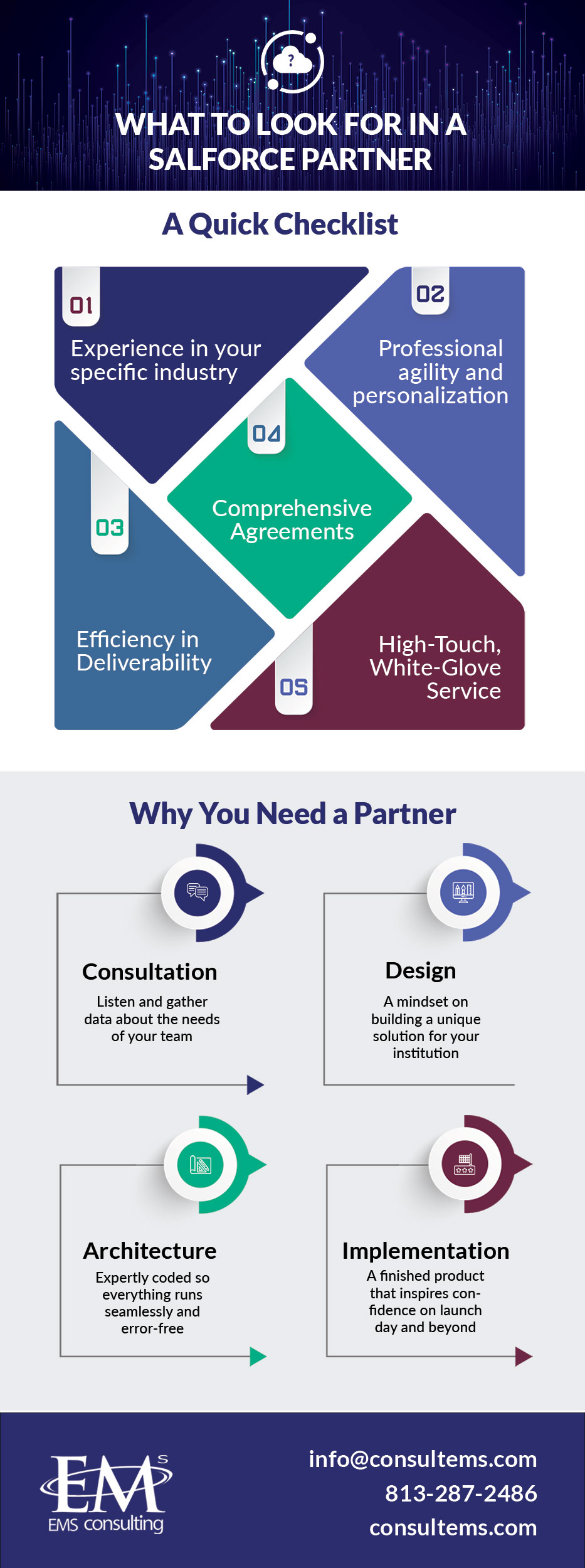EMS Consulting Salesforce CRM Team
What to Look for in a Salesforce Partner: Your Complete Checklist
Salesforce is a powerful but complex tool that requires a team effort. Anything other than getting it right the first time is not an option. While you’ll be leaning on your team and various departments to make it a reality, you’ll need the expertise of a Salesforce implementation partner to complete the project.
In the banking industry, customer experience is sacred. It doesn’t matter if it’s a child’s first savings account or your big-name corporate client. When a financial institution plans an upgrade to Salesforce, the best outcome for your customers is nothing less than a quiet, no-ripples-on-the-surface transformation. Just turn on the spigot and the information flows through, quickly and quietly, everything going exactly where it needs to be.
Because the very last thing you want is the crossing of the proverbial wires. Misdirected data or any botching of the launch of Salesforce can unravel the decades-long relationship you’ve worked hard to build.
To make your launch a success, you need that strong partner, a true liaison between Salesforce and your financial organization.

What do you need from a Salesforce partner?
To achieve a successful launch of Salesforce, a high-quality partner will focus on these four tenets:
- Consult: Listen and gather data about the needs of your team.
- Design: A mindset on building a unique solution for your institution.
- Architect: Expertly coded so everything runs seamlessly and error-free.
- Implement: A finished product that inspires confidence on launch day and beyond.
Checklist for Salesforce implementation partners
Check Point #1: Experience in Financial Industry
As you evaluate Salesforce partners, you might gravitate to prospects with real-life experience with other financial institutions. That’s a smart place to start.
Plenty of Salesforce implementation partners are generalists, which means they may or may not have someone on the team with the relevant background. They may be a quick study, but why waste time on the learning curve?
A better investment of your company’s time and capital would be with a partner that walks in with real-life experience in the financial sector, with an expert-level understanding of its services, systems and requirements.
Bottom line, experience in your industry matters deeply when it comes to implementing Salesforce.
Check Point #2: Agility and Personalization
When it comes to finding a Salesforce implementation partner, you’re not just investing in their specialty. A high-quality partner shouldn’t make you fit to their processes. They should be going the extra mile to ensure Salesforce and the implementation fits with the specific needs of your organization.
As you discuss their expertise and experience in implementing Salesforce at a financial institution, you’ll want to get a sense of their agility.
Experience is valuable, but it can also create blind spots. A Salesforce partner will encounter common threads to common problems, and that will and should inform their problem-solving. Two financial organizations, for example, might have 16 disparate systems to integrate into Salesforce, with 16 specific problems to solve for.
But if they take a rigid, cookie-cutter approach to link those 16 systems based solely on what happened at the other place, it will be easy to overlook opportunities to help you adapt Salesforce to meet your organization’s needs.
To get a sense of their ability to design the Salesforce solution that works precisely right for your organization, ask many questions. Inquire about methods and discovery processes to identify and solve issues to help you achieve a custom fit. Or, you could end up being “haunted” by quirks.
Check Point #3: Lasting Agreement
When you partner with an outside agency, the provisional nature of these agreements can work against you. Sure, it’s helpful to use end dates to set goals and deadlines. Unfortunately, these agreements overlook that questions and problems don’t stop just because a contract does. This is especially true for large-scale, transformative projects, such as implementing Salesforce.
Your Salesforce partner should be thinking beyond the short-term job contract. In this case, a long-term business services agreement isn’t just nice to have, it’s necessary. Salesforce implementation lasts for phases or even years.
Check Point #4: Deliverability
How can your partner help your organization plan and execute the implementation of Salesforce? Building the architecture for Salesforce shouldn’t consume an excess of staff resources. Your team’s participation is critical, but at the same time, your Salesforce partner will have a complete but efficient plan.
Check Point #5: White-Glove Service
Anyone can tout good service. Most people and organizations believe in their capabilities because they honestly care. But a good Salesforce partner should design systems, processes and roles to make sure everyone is set up to deliver the five-star service your institution expects. Request plenty of detail on how they ensure white-glove service, and who plays what role, from project managers to system architects.






